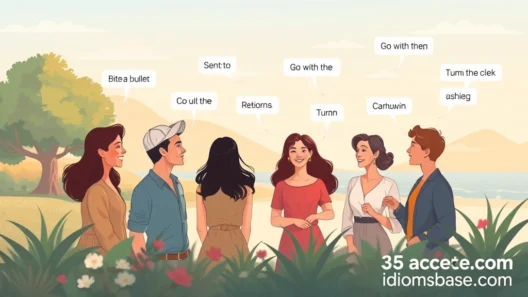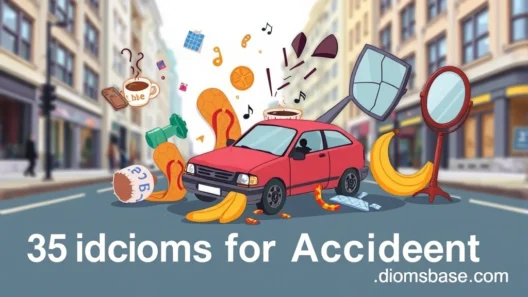Have you ever felt that surge of satisfaction after nailing a big project or finally reaching a long-sought-after goal? That incredible feeling of achievement is something we all chase, whether it's learning a new skill, getting a promotion, or simply mastering a challenging recipe. But how do we talk about these triumphs, these moments of shining success? English is absolutely bursting with colorful and vivid idioms that perfectly capture the essence of achievement!
These aren't just fancy phrases; they're little linguistic shortcuts that add flavor and depth to your conversations. Understanding them can truly elevate your English, making you sound more like a native speaker and helping you connect with others on a deeper level. Plus, they're just plain fun to learn!
So, get ready to dive into a treasure trove of expressions that celebrate success, hard work, and reaching the top. Let's explore 35 fantastic idioms for achievement that will help you articulate your wins with flair!
35 Idioms for Achievement
Here’s a fantastic collection of idioms you can use to describe success, reaching goals, and making progress. Each one paints a unique picture!
- Hit the nail on the head: To describe something exactly right. "You really hit the nail on the head with your analysis of the market trends!"
- Pass with flying colors: To succeed easily and exceptionally well. "She passed her final exams with flying colors, scoring top marks."
- Come up trumps: To produce a good result, often unexpectedly. "When we needed a solution, John really came up trumps with his innovative idea."
- Go the extra mile: To make a special effort to achieve something. "Our team always goes the extra mile to ensure customer satisfaction."
- Break new ground: To do something innovative or previously unattempted. "The scientists broke new ground with their research into renewable energy."
- Reach for the stars: To set ambitious goals and aim high. "Don't be afraid to reach for the stars; you're capable of anything!"
- Make the cut: To meet the required standard or qualify for something. "After weeks of training, he finally made the cut for the Olympic team."
- Pull it off: To succeed in doing something difficult. "It was a tricky presentation, but she really pulled it off."
- Get a handle on: To understand or deal with something effectively. "Once I got a handle on the new software, my productivity increased."
- Clear the hurdle: To overcome an obstacle or difficulty. "They cleared the first hurdle in the project by securing the necessary funding."
- Sail through: To succeed easily and without difficulty. "He sailed through his driving test without a single mistake."
- On a roll: Experiencing a period of success or good luck. "Our sales team has been on a roll this quarter, exceeding all targets."
- Take the bull by the horns: To confront a difficult situation directly and bravely. "It was time to take the bull by the horns and address the conflict head-on."
- Come out on top: To win or be successful in a competition or difficult situation. "Despite the challenges, our company came out on top in the industry."
- A feather in one's cap: An achievement to be proud of. "Winning that award was a real feather in her cap."
- In the bag: Certain to be achieved or won. "With that final goal, the championship is definitely in the bag!"
- Hit the ground running: To start a new activity or job very quickly and effectively. "She hit the ground running in her new role, immediately making an impact."
- Get there: To eventually succeed in reaching a goal or destination. "It took a lot of effort, but we finally got there with the project."
- Make strides: To make significant progress. "The company has made great strides in developing sustainable technologies."
- Turn the corner: To pass a critical point and begin to improve. "After weeks of struggle, the business finally turned the corner."
- The sky's the limit: There is no limit to what can be achieved. "With your talent and dedication, the sky's the limit for your career."
- Come full circle: To return to an original position or situation after a long journey or process. "After years abroad, her career came full circle when she returned to work for her hometown company."
- Win hands down: To win very easily and decisively. "Our team won the debate hands down."
- Get up to speed: To learn new information or skills quickly. "I need to get up to speed on the new company policies."
- Have the Midas touch: To be successful in everything one undertakes. "Everything he invests in turns to gold; he truly has the Midas touch."
- Be on top of the world: To be extremely happy because of a great achievement. "After graduating, she was on top of the world."
- Clear sailing: Smooth and easy progress without difficulties. "Once we finished the planning stage, it was clear sailing for the rest of the project."
- Make a splash: To attract a lot of attention and be very successful. "The new artist made a big splash with her debut album."
- Reap the rewards: To enjoy the benefits of one's hard work. "After years of dedication, she is now reaping the rewards of her efforts."
- Come out smelling like a rose: To emerge from a difficult or negative situation unharmed or with one's reputation intact. "Despite the scandal, he managed to come out smelling like a rose."
- Leave no stone unturned: To do everything possible to achieve a goal or find something. "We will leave no stone unturned in our search for the best solution."
- Put one's best foot forward: To make a good impression or to start an endeavor with maximum effort. "She put her best foot forward in the job interview."
- Seize the day (Carpe Diem): To make the most of the present opportunity. "Don't wait for tomorrow; seize the day and start your project now!"
- Crack the code: To find the solution to a complex problem or puzzle. "After months of research, they finally cracked the code to the ancient inscription."
- The proof is in the pudding: The true value or success of something can only be judged when it has been tried or used. "He claims his new diet works, but the proof is in the pudding when we see his results."
Key Takeaways
Wow, what a journey through the world of achievement idioms! Here are the core ideas to remember:
- Vivid Language: Idioms add color and precision to how you describe success. They're not just words; they paint a picture!
- Cultural Nuance: Understanding these phrases helps you grasp the subtle ways native speakers express ideas, making your communication much more authentic.
- Boost Your Fluency: Using idioms naturally shows a higher level of English proficiency. It's a sign you're truly comfortable with the language.
- Celebrate Success: Many of these idioms are positive and uplifting, perfect for celebrating your own achievements and those of others.

So, next time you or someone you know achieves something wonderful, try using one of these fantastic idioms. You'll not only express yourself more effectively but also impress those around you with your linguistic prowess!
Frequently Asked Questions (FAQ)
You might have some questions about incorporating these idioms into your daily conversations. Let's tackle them!
Q1: Why are idioms important to learn?
Idioms are super important because they are a fundamental part of everyday language for native speakers. They add richness, humor, and nuance to communication. Without understanding them, you might miss the true meaning of a conversation or a piece of writing. Plus, using them correctly makes you sound more natural and fluent, helping you connect better with English speakers. Think of them as secret codes that unlock deeper understanding!
Q2: How can I remember so many idioms?
That's a great question, and it's a common challenge! The best way to remember idioms is not by memorizing long lists, but by using them in context. Try these tips:
- Contextual Learning: When you learn a new idiom, try to create a sentence or a short story using it. The more personal the example, the better you'll remember it.
- Visual Association: Many idioms create a strong mental image (like "hit the nail on the head"). Try to visualize what the idiom describes.
- Active Practice: Try to use one or two new idioms each week in your conversations or writing. Practice makes perfect!
- Immersion: Read books, watch movies, and listen to podcasts in English. You'll hear idioms used naturally, which helps them stick in your mind.
- Flashcards: If you enjoy traditional methods, make flashcards with the idiom on one side and its meaning and an example sentence on the other.

Q3: Are these idioms appropriate for all situations (formal/informal)?
That's a very insightful question! While many of these idioms are versatile, some are more suited for informal or semi-formal situations. For example, "on a roll" or "in the bag" are perfectly fine in most casual and business settings. However, phrases like "come out smelling like a rose" might be a bit too informal for a very serious or formal report.
When in doubt, consider your audience and the context. Generally, in very formal academic writing or highly official documents, it's safer to stick to more direct language. But for presentations, team meetings, or everyday conversations, these idioms will certainly make your language more engaging!
Q4: Can I use these idioms if English is not my first language?
Absolutely, yes! Using idioms is a fantastic way to show your growing mastery of the English language. It demonstrates that you're not just translating word-for-word but understanding the deeper cultural and linguistic nuances. Don't be afraid to try them out! Start with the ones you feel most comfortable with, and gradually expand your usage. People will appreciate your effort and ability to use such rich expressions. It's a sign that you're truly embracing the language!
Q5: What's the difference between an idiom and a proverb?
That's a common point of confusion! Here's a simple way to think about it:
- Idiom: A group of words established by usage as having a meaning not deducible from those of the individual words. It's a phrase where the meaning isn't obvious from the literal words. For example, "break a leg" means "good luck," not to actually break a limb!
- Proverb: A short, popular saying that expresses some general truth or piece of advice. Proverbs are often complete sentences and offer wisdom. For example, "Actions speak louder than words" is a proverb that advises us to judge people by what they do, not what they say.
So, while both are fixed expressions, idioms often have a figurative meaning that's hard to guess, while proverbs typically offer advice or a general truth.
We hope these idioms bring you great success in your English journey. Keep practicing, keep learning, and you'll surely "pass with flying colors!"







